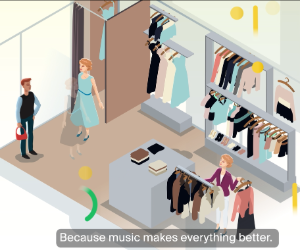Background music
In public spaces and commercial areas
Do you also use music outside the private sphere?
In passenger transport
Do you play music or films on coaches, trains or airplanes?
How to register:
- Choose the tariff: choose the right tariff for your music use.
- Secure a licence: acquire a licence online or in hard copy.
- Use music: use music in your business – lawfully and fairly
Answers to the most frequently asked questions (FAQ)
-
Background music is music played in commercial or public spaces with a view to creating a welcoming atmosphere.
Background music is mainly used in:
- shops,
- bars and restaurants,
- lobbies and waiting rooms,
- offices and workstations, and
- over the phone, as music on hold
-
There are no exceptions for small shops or offices. The minute you start playing background music or running films and TV broadcasts on your premises you become liable for fees under Common Tariff 3a (CT 3a), available only in German, French and Italian.
In exchange for these fees, you are entitled to use the entire world repertoire of music – for a very low price.
-
Revenues collected under CT 3a (Common Tariff 3a) are distributed to the composers, lyricists, and performers of the music, and to the producers, screenplay writers and actors of the films and broadcasts concerned.
In Switzerland, these creative artists are represented by five collective management organisations: ProLitteris, SUISA, SUISSIMAGE, SOCIETE SUISSE DES AUTEURS (SSA) and SWISSPERFORM. Since CT 3a is by definition a common tariff, you receive a single invoice, from SUISA. By paying SUISA's invoice, you extinguish the claims of all five organisations.
For further information, see the SUISAblog: "How SUISA distributes fees collected for background entertainment"
-
If you use musical works or services in your business or in public, the relevant composers, lyricists, performing artists, or screenplay writers and producers, and their publishers, are entitled to remuneration by law.
You have to pay fees under Common Tariff 3a (CT 3a) if at least one of the following circumstances applies to your business:
- background music is played in your restaurant, store or other business premises,
- you play films, radio or TV broadcasts on your premises;
- you have guestrooms, holiday homes, rooms for patients, or the like, equipped with devices for playing films and radio and TV broadcasts,
- you play music on hold on your telephone waiting loop,
- your company cars are equipped with radios.
-
Fees under Common Tariff 3a (CT 3a) are charged based on the surface area on which the music, film, or TV broadcast is played.
In this context:
- the surface areas per location, including any guestrooms, are added together.
- If a customer operates several locations (e.g. business premises, shops, factories, branches, etc.), remuneration is charged separately for each location.
The fees and particulars are set out in the tariff information (available only in German, French and Italian) CT 3a.
For music on hold (phone waiting loops), the reference basis is the number of active lines on the exchange.
-
You must automatically contact SUISA if you use music or audiovisual content in your business; the simplest way to do so is online at
www.suisa.ch/3aAs part of our marketing strategy, we also contact businesses directly. If you use music without the requisite licence from SUISA, you can be charged double the applicable rate.
If you have forgotten to register, please contact us promptly. We will invoice you for your prior unlicensed usage at the normal CT 3a rate.
Tip: If you register via the SUISA customer portal, you will be granted a 5% discount on your invoice.
-
No. There are no exemptions from the obligation to pay the fee.
Whoever uses music or audiovisual works commercially or publicly is required by law to pay a fee to the rightholder(s). This obligation is statutory and the remuneration is set in the relevant tariff.
By law, authors and other rightholders are entitled to remuneration for their work.
-
No. There are other tariffs for live music. Just as there are various kinds of music uses, there are various tariffs for the different uses.
Common Tariff 3a (CT 3a) does not apply to live music; the relevant tariff is either the concert tariff (CT K) or the tariff for events with live music (CT H).
Find more information here:
-
When you buy a CD, you acquire the right to play it in your private sphere, i.e. at home or in your car. Use outside the private sphere is not included in the price of the CD. To play the CD elsewhere, you have to pay a licence fee under CT 3a.
-
No. Unless otherwise stipulated in the licence, SUISA generally does not need programme listings.
-
SUISA invoices Common Tariff 3a (CT 3a) fees once a year. As a rule, the licence is granted for a full calendar year, from 1 January to 31 December.
For businesses or holiday homes that do not play background music or films all year round, the fee is only charged for the actual months of use.
Important: If anything changes (e.g. duration of use, location, surface area) you must notify SUISA by 15 January of the following year at the latest. Otherwise, you will be invoiced the same fees as the year before.
In the case of single uses, for example at fairs or events limited in time, a single invoice is issued for the relevant time frame. The fee for a fraction of a month is due for the full month.
The minimum amount is one month’s fee.
-
Relevant changes must be notified to SUISA via the customer portal www.suisa.ch/kundenportal by 15 January of the following year at the latest.
If you have not paid your invoice yet, we will cancel it and issue you a new revised one.
If you have already paid the invoice, we will refund the difference or carry it forward to the next invoice.
-
The fee paid to SERAFE is based on the Federal Radio and Television Act (RTVA). Its purpose is to fund radio and TV broadcasting in Switzerland. The Federal Office of Communications (OFCOM) distributes these funds to the SRG SSR and other broadcasters with a performance mandate to enable them to produce and broadcast their programmes.
The remuneration charged by SUISA serves a different purpose: SUISA’s fees are based on the Copyright Act and are distributed to the composers, lyricists, and performers of the music, and to the producers, screenplay writers and actors of the films and broadcasts concerned.
These persons are entitled to remuneration when their works are used outside the private sphere, e.g. in shops, restaurants, lobbies and waiting rooms, in offices and on-hold.
-
No. The fees payable to SUISA are separate from the radio and television fees.
Even if a business is not required to pay any reception fees, the remuneration under CT 3a is still due for any music, films or TV broadcasts played outside the private sphere – for example, on business premises, in restaurants or offices.
-
No – the obligation to pay remuneration also applies to holiday home rentals and guestrooms.
If the holiday home or guestroom is equipped with music devices or TV screens, the landlord must pay licence fees in accordance with Common Tariff 3a (CT 3a).
-
Yes. If you organise a public viewing (by definition outside the private sphere), you need a licence from SUISA
The type of licence depends on the size of the screen:
1. Screens under 3 metres in diagonal
You need a licence in accordance with Common Tariff 3a (CT 3a).
If you are already a customer of SUISA and have a CT 3a licence, no further action is required.2. Screens over 3 metres in diagonal
In this case, Common Tariff 3c (CT 3c) applies.For further information, see: Public viewing on large screens
-
The law requires all Swiss collective rights management organisations, SUISA included, to issue tariffs for their royalties. These tariffs are negotiated together with the main user associations.
The tariffs are then reviewed and approved by an independent body, the Federal Arbitration Commission for the Management of Copyright and Related Rights (ESchK). The ESchK is appointed by the Federal Council and assures equal representation of the parties, i.e. it is composed of representatives from both sides.
Once the tariffs have been approved by the ESchK, they are published in the Official Journal. This ensures that tariff rates are not abusive.



